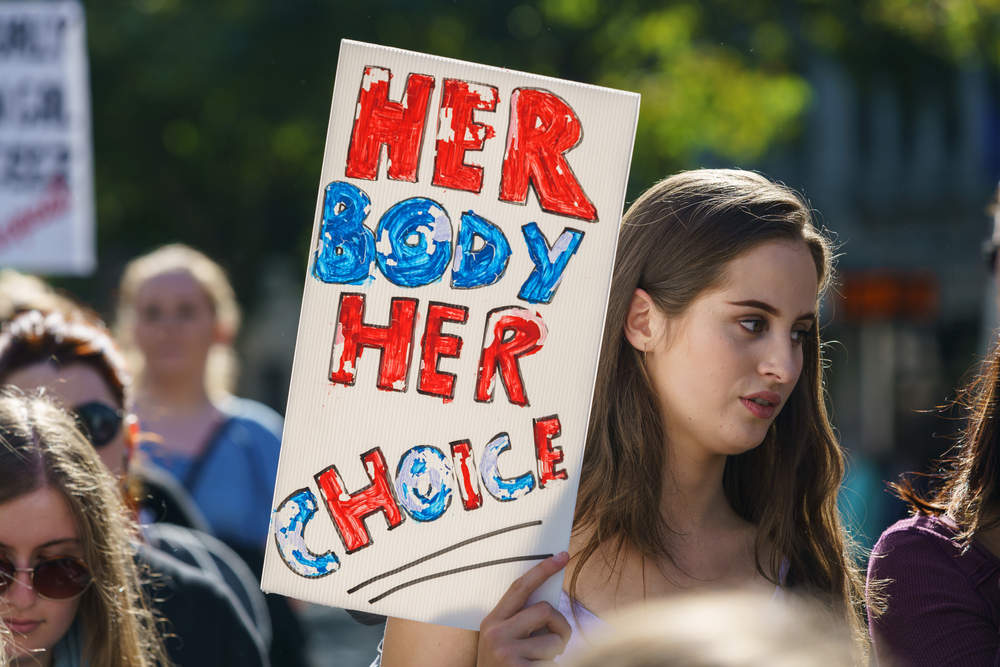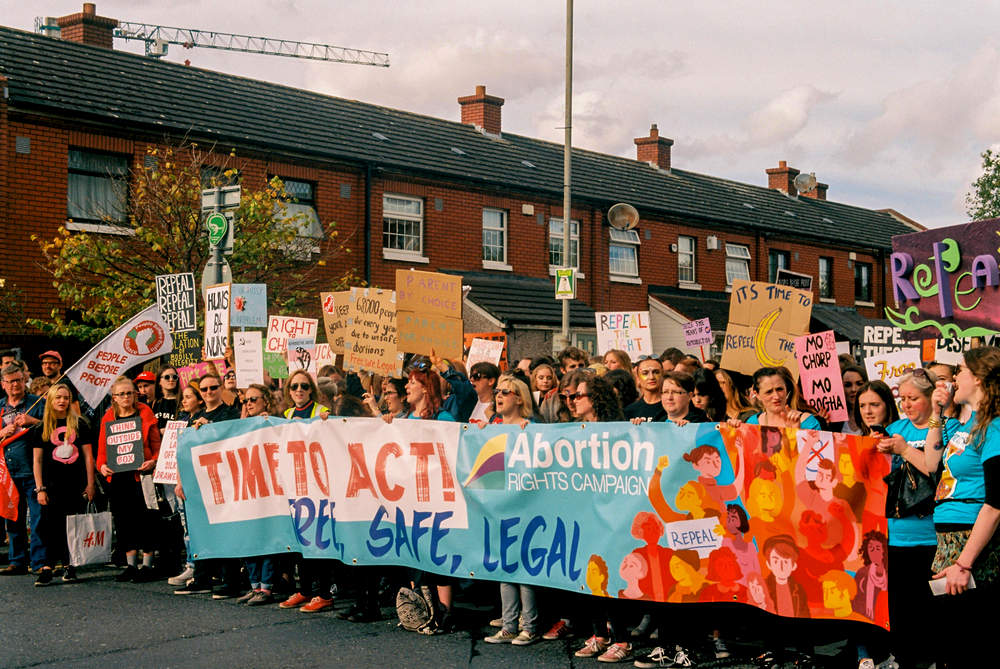
Seven months and nine days ago 1.4 million people in Ireland voted to remove its anti-abortion laws.
Irish Health Minister Simon Harris hailed the passing of the legislation as a “new era for Irish Women”. The abortion service started today (03/01/2019), it was the first time in Ireland had opened abortion services.
Abortion services will be provided by Ireland’s health service through GPs, family planning services, maternity units and hospitals across the country.

Shutterstock.com
The law in Ireland now allows abortions:
- Up to 12 weeks of pregnancy
- Where there is a risk to the life or of serious harm to the health of the pregnant person
- Where there is a condition likely to lead to the death of the foetus before or shortly after birth
It will be provided for anyone who fits one of the three above and will be free to anyone who lives in Ireland.
Dr Peter Boylan, Consultant Obstetrician and Gynaecologist working with HSE to support the introduction of abortion services in Ireland, said: ‘From today, our health service is ready to provide abortion services to people who need it. Clinical guidance and training has been provided and circulated to healthcare teams nationwide to assist practitioners in the clinical decision making involved in providing abortion care.’
A lot of work has been done by people across our health service to prepare for this new service, with a sufficient number of GPs signed up and others continuing to do so. Services will be provided in GP practices and family planning services, and maternity units and hospitals across the country.’
The following maternity units and hospitals will be providing abortion care:
- National Maternity Hospital, Holles Street, Dublin
- Midland Regional Hospital Mullingar
- Rotunda Hospital, Dublin
- Our Lady of Lourdes Hospital Drogheda
- University Hospital Galway
- Mayo University Hospital, Castlebar
- University Maternity Hospital Limerick
- Cork University Maternity Hospital
- University Hospital Waterford
Other hospitals will be providing abortion care in the near future.
Helen Deely from the HSE’s Sexual Health and Crisis Pregnancy Programme outlined the supports offered by My Options, saying: ‘We’re here to help you, with professional counsellors, if you want to talk to someone, have a question about continued pregnancy supports, or want information about abortion services. The HSE’s My Options service is free of charge and you can contact us at Freephone 1800 828 010.’
Ireland’s history with abortions:

Shutterstock.com
1861 – Abortion was first banned by the Offences Against the Person Act and stays in place after Irish independence.
1983– a referendum. The Eighth Amendment to Republic’s constitution (Article 40.3.3) is introduced after a referendum. It “acknowledges the right to life of the unborn and, with due regard to the equal right to life of the mother, guarantees in its laws to respect, and, as far as practicable, by its laws to defend and vindicate that right”.
1992 – a 14-year-old suicidal rape victim is initially prevented by the courts from travelling to England to terminate her pregnancy. It became known as the X case. The ruling prompted demonstrations by both anti-abortion and pro-choice campaigners across Ireland, in New York and London. The ruling was later overturned by Ireland’s Supreme Court. It said the threat of suicide is the grounds for an abortion in Ireland.
2002 – another referendum was held, and the people of Ireland are asked if the threat of suicide as a ground for legal abortion should be removed. It is then rejected by voters.
2010 – After three women take a case against Ireland, the European Court of Human Rights rules the state has failed to provide clarity on legal availability of abortion in circumstances where the mothers life is at risk.
2012 – A campaign to loosen the abortion law gathers momentum after Indian woman Savita Halappanavar dies in a Galway hospital after being refused an abortion during a miscarriage. Following her death 2,000 protesters gathered outside the Irish Parliament in Dublin to call for the Irish government to urgently reform abortion laws.
2013 – Abortion legislation is again edited to allow terminations under certain conditions – the Protection of Life During Pregnancy Act is signed into law. It legalised abortion when the woman’s life is at risk due to medical complications or taking her own life. It was also introduced that a maximum penalty of 14 years imprisonment for having or assisting in an unlawful abortion.
2015 – The United Nations Committee on Economic, Social and Cultural Rights recommends a referendum on abortion, saying it is concerned at Ireland’s “highly restrictive legislation” and calls for a referendum to repeal Article 40.3.3 of the Constitution. The committee called for a revision of the 2013 Protection of Life During Pregnancy Act and urges the adoption of guidelines to clarify what constitutes “a real substantive risk” to a woman’s life.
2016 – The United Nations Committee says that Ireland’s ban on abortion subjected a woman carrying a foetus with a fatal abnormality to discrimination and cruel, inhuman or degrading treatment. It calls for the strict prohibition to be reversed, including reforming the right to life of the unborn in the constitution if necessary, to allow women to voluntarily terminate a pregnancy safely.
2017– The Citizens’ Assembly votes to recommend the introduction of unrestricted access to abortion. It votes 64% to 36% in favour of having no restrictions in early pregnancy. The chairperson, Justice Mary Laffoy, said: “The members voted that they wanted to remove Article 40.3.3 from the constitution, and for the avoidance of doubt, to replace it with a provision in the constitution, which would make it clear that termination of pregnancy, any rights of the unborn, and any rights of the pregnant woman are matters for the Oireachtas (Irish Parliament).
“In other words, it would be solely a matter for the Oireachtas to decide how to legislate on these issues.”
However, anti-abortion campaigners dismiss the results of the ballots as a “muddled and confused farce”.
2018 – In March Irish Housing Minister Eoghan Murphy signs an order to set the date for an abortion referendum. On May 25th, the voters go to the polls where the ballot asks of, they wish to approve the 36th amendment to Ireland’s constitution (remove the abortion ban). Turnout is 64.51%, in favour of ending the country’s ban on abortion: 66.4% yes to 33.6% no. The Yes vote allows the government in Dublin to introduce legislation allowing abortion in the first 12 weeks of pregnancy, and between 12 and 24 weeks in exceptional circumstances.